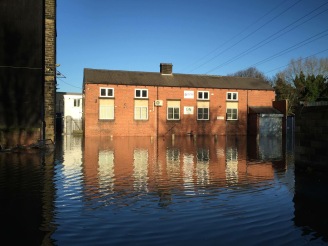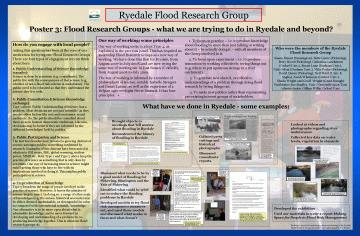 Over Christmas 2015 various areas in the North of the UK (including my home city) were hit by unprecedented levels of rainfall producing widespread flooding. The pictures were quite astonishing, even to those who live in places like Hebden Bridge who have become fairly used to regular flooding. For days the news here in the UK seemed to focus on nothing else except the pictures of devastation, stories of those affected and, inevitably, who was to blame.
Over Christmas 2015 various areas in the North of the UK (including my home city) were hit by unprecedented levels of rainfall producing widespread flooding. The pictures were quite astonishing, even to those who live in places like Hebden Bridge who have become fairly used to regular flooding. For days the news here in the UK seemed to focus on nothing else except the pictures of devastation, stories of those affected and, inevitably, who was to blame.
As a knowledge mobiliser, I was really interested in a story that I came across about a flood defence scheme in a small town way up on the North Yorkshire Moors. The story (How a Yorkshire town worked with nature to stay dry) focused on how residents of this small town had managed to protect it from flooding by “embracing the very opposite of what passes for conventional wisdom” and “working with nature, not against it”. The story was really about the success of the flood defence scheme itself (although, as with most things, naysayers also abounded) but my interest lay in the way in which the scheme had come about.
A few things in the article immediately caught my attention. First off, local people were frustrated with the situation that they found themselves in (subject to regular flooding but lacking any funding or approval for an expensive flood defence scheme) and so decided to “take matters into their own hands”. Second, finding out from ‘a local environmentalist’ how floods were managed in the past, they decided to “try to go back to the future”. Third, they then got together with “top academics…to examine all options”. This partnership resulted in funding and the eventual completion of a project to slow the flow of water from the hills. Of course, when you do some digging you realise that there is a lot more to the story. One of the most captivating aspects was the Understanding Environmental Knowledge Controversies project, which ran in 2007-8 and involved researchers and local people working together to take a fresh look at the problems of flooding in the area.
For me there are a few lessons that I think might be useful for me as a knowledge mobiliser. Lesson number one – local experiential knowledge and enthusiasm are brilliant catalysts for getting something off the ground and if you want to mobilise any kind of knowledge, it’s probably the place to start. Lesson number two – giving local people access to a little bit of expert knowledge can really fire their imaginations and give them some initial ideas about how to move forward with  whatever problem they are facing. It doesn’t seem to take much if the local experience and enthusiasm are there. Lesson number three – researchers need to work alongside local people, rather than the other way round if you really want to move forward. In this case academics worked alongside local people in a Flood Research Group, empowering them to retain ownership of the local problem and incorporate local knowledge and experience into the development of a solution. Click on the image on the right to find out more.
whatever problem they are facing. It doesn’t seem to take much if the local experience and enthusiasm are there. Lesson number three – researchers need to work alongside local people, rather than the other way round if you really want to move forward. In this case academics worked alongside local people in a Flood Research Group, empowering them to retain ownership of the local problem and incorporate local knowledge and experience into the development of a solution. Click on the image on the right to find out more.
In the midst of the devastation caused by the floods at Christmas, this story really gave me something to smile about and a renewed hope that helping people to share and mobilise knowledge can make a big difference in many areas of life.

I remember reading about this and thinking exactly what you have written especially “local experiential knowledge and enthusiasm are brilliant catalysts for getting something off the ground”. Engaged scholarship works with local knowledge and lived experience expertise. In Canada we work hard to acknowledge and value traditional and indigenous forms of knowing. Thanks for posting this.
LikeLike